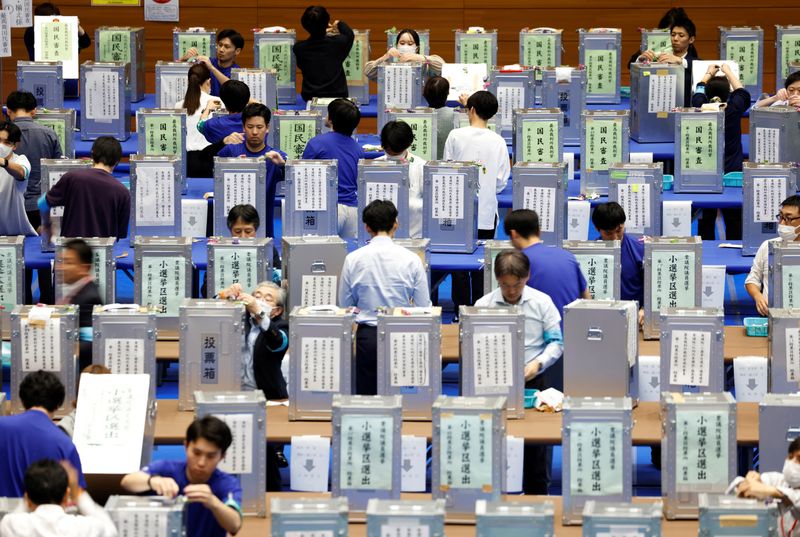Stock Markets
Japan’s ruling coalition loses majority, election outcome in balance

By Sakura Murakami, John Geddie and Tim Kelly
TOKYO (Reuters) -Japan’s ruling coalition lost its parliamentary majority in a drubbing at Sunday’s national election, raising uncertainty over the make-up of the next government and the outlook for the world’s fourth-largest economy.
With all but 20 of the 465 seats accounted for, Prime Minister Shigeru Ishiba’s Liberal Democratic Party (LDP), which has ruled Japan for almost all of its post-war history, and junior coalition partner Komeito took 209 seats in the lower house of parliament, public broadcaster NHK reported.
That was down from the 279 seats they held previously and marked the coalition’s worst election result since it briefly lost power in 2009.
“This election has been very tough for us,” a sombre-looking Ishiba told TV Tokyo.
Komeito’s Keiichi Ishii, who took over as that party’s new leader last month, lost in his district.
The biggest winner of the night, the main opposition Constitutional Democratic Party of Japan (CDPJ), had 143 seats so far, up from 98 previously, as voters punished Ishiba’s party over a funding scandal and inflation.
The outcome may force parties into fractious power-sharing deals to rule, potentially ushering in political instability as the country faces economic headwinds and a tense security situation in East Asia.
“This is not the end, but the beginning,” CDPJ leader Yoshihiko Noda told a press conference, adding that his party would work with other opposition parties to aim for a change of government.
Ishiba said he would wait until the final results, likely due in the early hours of Monday, before considering potential coalitions or other power-sharing deals.
The prime minister had called the snap poll immediately after being elected to head the party last month, hoping to win a public mandate for his premiership. His predecessor, Fumio Kishida, quit after his support fell due to anger over a cost of living crunch and the scandal involving unrecorded donations to lawmakers.
The election also took place nine days before voters in the United States – Japan’s closest ally – head to the polls in another unpredictable ballot.
POLITICAL DEALS, MARKET JITTERS
Japanese stocks and the yen are expected to fall while longer-dated government bond yields are seen rising as investors react to the uncertainty.
“The voters’ judgment on the ruling bloc was harsher than expected,” said Saisuke Sakai, senior economist at Mizuho Research and Technologies.
“Uncertainty over the administration’s continuity has increased, and the stock market is likely to react tomorrow with a sell-off, especially among foreign investors.”
The LDP has held an outright majority since it returned to power in 2012 after a brief spell of opposition rule. It also lost power briefly in 1993, when a coalition of seven opposition parties formed a government that lasted less than a year.
Smaller parties, such as the Democratic Party for the People (DPP) or the Japan Innovation Party, could now prove key to forming a government.
The DPP had 27 seats so far and the Japan Innovation Party 35 seats, according to NHK. But both propose policies at odds with the LDP line.
DPP chief Yuichiro Tamaki has not ruled out some cooperation with the LDP-led coalition, but Innovation Party head Nobuyuki Baba has rejected the idea.
The DPP calls for halving Japan’s 10% sales tax until real wages rise, a policy not endorsed by the LDP, while the Innovation Party has pledged tougher donation rules to clean up politics.
“The DPP is focused on ultimately making the country better and ensuring financial resources are allocated more appropriately, so that’s why I decided to vote for them,” Keisuke Yoshitomi, a 39-year-old office worker, said after casting his vote at a polling station in Tokyo.
Political wrangling could also be a headache for the Bank of Japan (BOJ) if Ishiba chooses a partner that favours maintaining near-zero interest rates when the central bank wants to gradually raise them.
The Innovation Party opposes further increases in interest rates, and the DPP leader has said the BOJ may have been hasty in raising rates, while the central bank wants to gradually wean the Japan off decades of massive monetary stimulus.

“With a more fluid political landscape, pushing through economic policies that include raising taxes, such as to fund defence spending, will become much harder,” said Masafumi Fujihara, associate professor of politics at Yamanashi University.
“Without a strong government, it would be more difficult for the BOJ to raise rates and keep the weak yen under control.”
Stock Markets
Suburban Propane director Logan sells $139k in shares
Stock Markets
Stock market today: S&P 500 closes lower, but posts big weekly win
Stock Markets
TD Bank promotes Laura Nitti to retail market president role

 Forex3 years ago
Forex3 years agoForex Today: the dollar is gaining strength amid gloomy sentiment at the start of the Fed’s week

 Forex3 years ago
Forex3 years agoUnbiased review of Pocket Option broker

 Forex3 years ago
Forex3 years agoDollar to pound sterling exchange rate today: Pound plummeted to its lowest since 1985

 Forex3 years ago
Forex3 years agoHow is the Australian dollar doing today?

 Cryptocurrency3 years ago
Cryptocurrency3 years agoWhat happened in the crypto market – current events today

 World3 years ago
World3 years agoWhy are modern video games an art form?

 Commodities3 years ago
Commodities3 years agoCopper continues to fall in price on expectations of lower demand in China

 Economy3 years ago
Economy3 years agoCrude oil tankers double in price due to EU anti-Russian sanctions





















